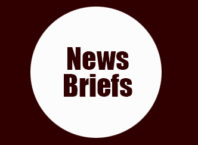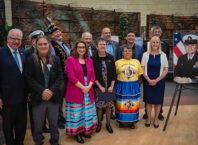
AAUW Honors
Ayn Dah Yung Center
(Photo by Verylnn Agrimonti)
Deb Foster,
executive director of Ain Dah Yung Center, accepted a generous
donation from AAUW (American Association of University Women)
president, Mary Chorewyez and president-elect, Carol Oeltjenbruns on
April 8 at 990 Summit Avenue in St. Paul. Ain Dah Yung (Our Home)
Center provides a healing place within the community for American
Indian youth – all ethnicities – and families to thrive in safety
and wholeness.
 Flanagan named Co-Chair of Cradle-to-K Cabinet
Flanagan named Co-Chair of Cradle-to-K Cabinet
In her
State of the City Address at the Minneapolis American Indian Center
on April 24, Mayor Betsy Hodges announced that Peggy Flanagan, White
Earth Nation citizen and Children’s Defense Fund of Minnesota
executive director, would co-chair Hodges’ Cradle-To-K Initiative.
According
to Hodges, research shows that disparities can be prevented by
effective early-childhood interventions. Along with Way to Grow
executive director Carolyn Smallwood, the initiative aims to align
work to to maximize a child’s readiness for early education.
Citing the
link between low Kindergarten readiness rates and high school
graduation rates for Minneapolis students, Hodges formed her
Cradle-To-K program in her mayoral campaign in August of last year.
The effort
identified components that it will work to support, including the
expansion of the Healthy Start program, which serves low-income and
vulnerable families with the skills and resources to care for
pregnant mothers and infants in the city; expand access to stable,
high quality, child-centered childcare; and serve as the hub for
stakeholders, ensuring no early childhood programming or coverage
gaps and facilitate resource-sharing.
Susan Klapel named environmental commissioner for Mille Lacs Band
ONAMIA,
Minn. – The Mille Lacs Band of Ojibwe announced April 15 that Susan
Klapel was appointed as the new commissioner of Natural Resources and
Environment.
Her
responsibilities cover a wide range of issues, including overseeing
tribal conservation efforts and managing the band’s hunting,
fishing and harvesting activities.
As
commissioner, Klapel will oversee the staff of the Department of
Natural Resources and Environment, including Mille Lacs Band
conservation officers and tribal biologists. She will also work
collaboratively with the state of Minnesota DNR and the Great Lakes
Indian Fish and Wildlife Commission.
“Susan
will be a strong addition to the Mille Lacs Band government,”
Melanie Benjamin, chief executive of the Mille Lacs Band said. “She
brings experience in the environment and law enforcement as well as a
commitment to preserving and protecting our natural resources for
future generations.”
Previously,
Klapel has served as an investigator for the Mille Lacs Band Gaming
Regulatory Authority as well as a police officer and conservation
officer with the Mille Lacs Band. She is also a member of the
Woodlands Bank Board of Directors.
Thunder Rocketry team wins launch competition
MILWAUKEE,
Wis. – The Thunder Rocketry Club Team representing Fond du Lac
Tribal and Community College soared to a first place finish in the
Altitude Prediction Competition at the fifth annual First Nations
Tribal Rocket Launch Competition held April 3-5 in Milwaukee,
Wisconsin.
This
year’s win by the Thunder Rocketry Team was the team’s highest
finish in four years of participation. The team’s previous best
finish was third place in 2013. Team members traveling to Milwaukee
included students Gordon Loree and Cheryl Foss, both of Cloquet,
Minn. and club advisor Steve Highland.
“We had
two rockets, both launched and landed successfully,” Loree said.
“It was great to see everyone so excited about the successful
launch and landing of the rockets they designed. This is better than
playing a video game because we actually designed, built and flew
real rockets.”
The team
captured first place in the Altitude Prediction Competition for
tribal college teams, estimating 3,000 feet and then flying their
winning rocket to 3,027 feet for a margin less than 1 percent, which
was the best of all teams entered in the competition.
Team
members didn’t expect to win the competition as their primary goal
was to have a successful launch and gather data about the rockets.
Each rocket was over six feet in length, one with a six-inch diameter
and one with a four-inch diameter and weighed about 16 pounds.
The
rockets carried on-board altimeters, electronics, an engine and
parachute. The team plans future enhancements to the rockets,
including external decorations, additional on-board electronics, and
a camera to document the flight and return trip to the ground. “We
thought that it might fly higher and that we would need to engineer
ways to slow it down,” Loree said. “It was strictly a test flight
but everything worked out just right. Since the goal of the regional
competition is to reach three thousand feet, we are not going to
tinker much with the design of the rocket.”
The
Thunder Rocketry Club attributes some of their near flawless success
to the use of a program called ROCKSIM, which aided them in design
through simulated launches and flights under different conditions.
Teams were expected to construct a rocket that would launch, fly
straight, deploy a parachute and safely float back to the ground with
little to no damage.
Part of
the competition included a team presentation about how they designed
and built the rockets. Participants were required to answer technical
questions from contest organizers and members of competing teams.
“Students learn how to apply math, sequencing of events, attention
to detail, construction techniques, safety, passing inspection, and
problem-solving on the fly,” Highland said. “These are not
children’s rockets, they are powerful and can fly up to 21,000 feet
in competitions where top altitudes are allowed. Launches require FAA
approval and rockets must pass a strict inspection and numerous
safety checks.”
The contest
was sponsored by the Wisconsin Space Grant Consortium and was hosted
by the University of Wisconsin-Green Bay.
The
Thunder Rocketry Club is open to anyone interested and welcomes both
students and community members to join them as they prepare for and
participate in future launches. Previous student participants have
gone on to NASA summer internships and related career areas such as
physics, engineering, and computer programming. For more information
about the Thunder Rocketry Club Team and future launch competitions,
contact club advisor Steve Highland via email to
shighland@fdltcc.edu.






